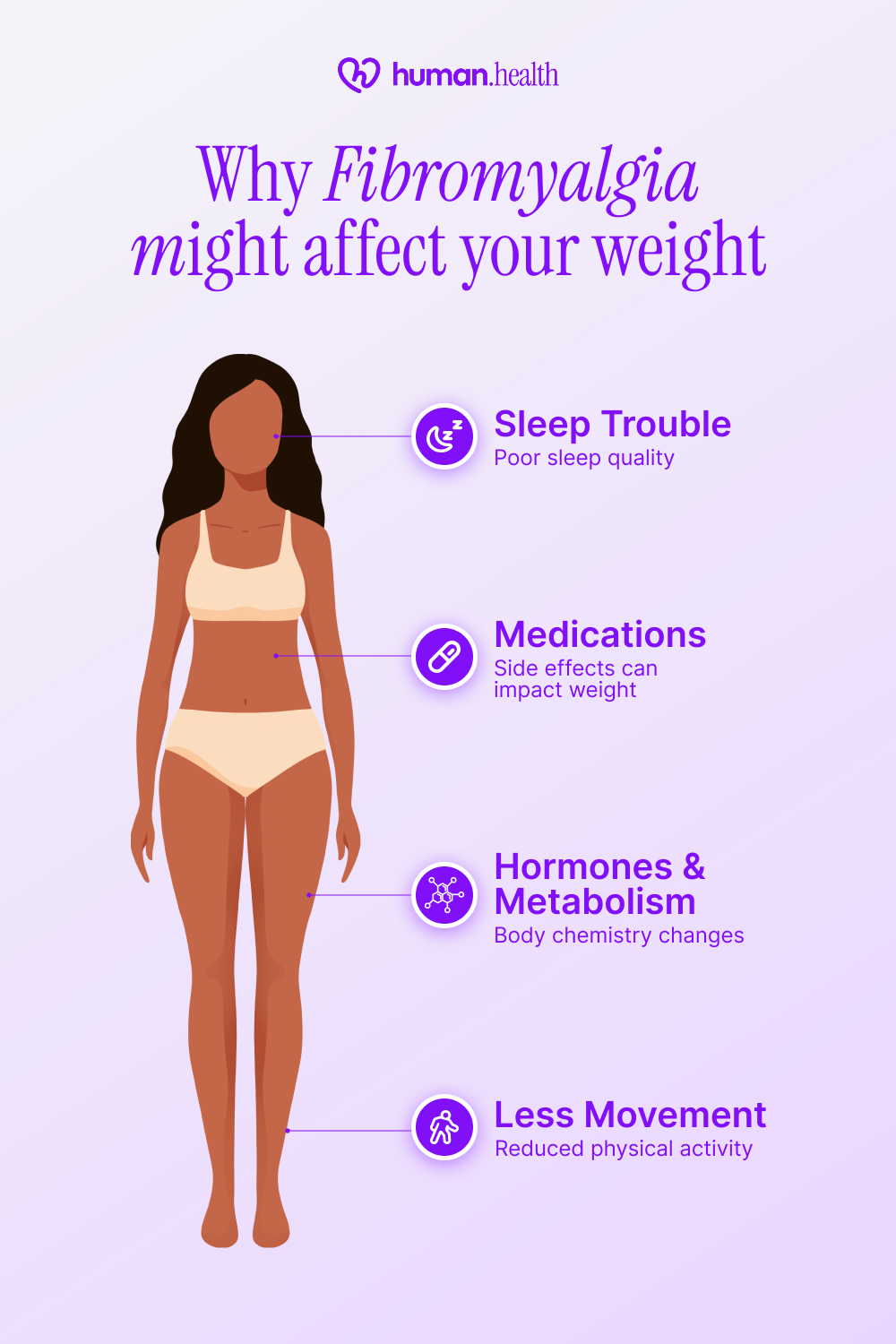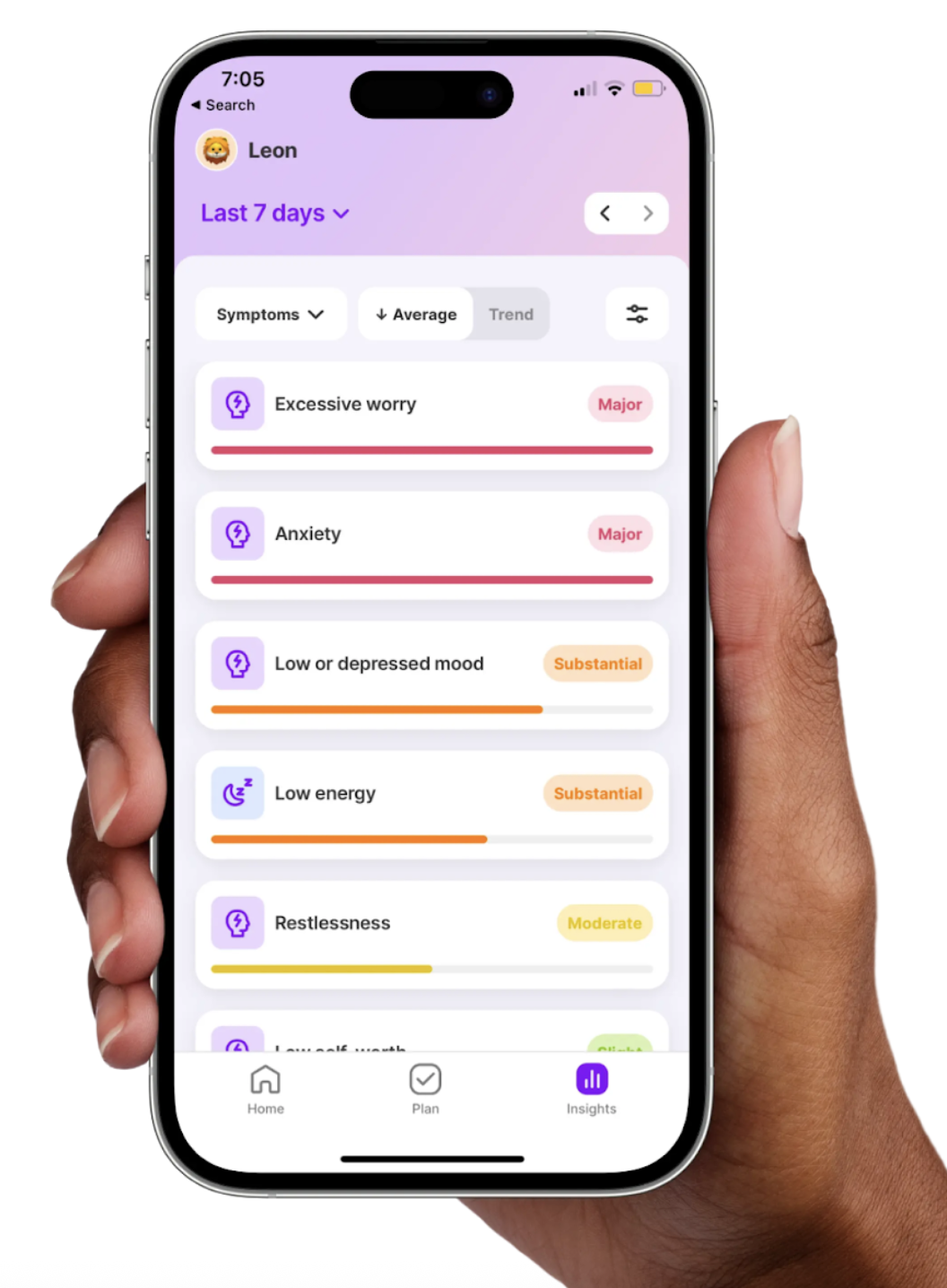Fibromyalgia Weight Gain: Causes & How to Manage It
October 1, 2025

- Fibromyalgia and weight gain are connected. Research suggests that people living with fibromyalgia are more likely to experience weight gain, which can worsen symptoms like pain, fatigue, and stiffness.
- Several factors may play a role. These include reduced physical activity due to pain, poor sleep quality, hormonal changes, and side effects from certain medications.
- Weight gain can make symptoms worse. Studies show that excess weight may increase inflammation, reduce mobility, and put added strain on joints and muscles already affected by fibromyalgia.
- Gentle lifestyle strategies can help. Small, realistic steps such as light activity, mindful eating, and sleep tracking may support healthier weight management.
- Using the Human Health app to log habits and track symptoms can make patterns clearer to discuss with your doctor.
Disclaimer: Human Health is a health tracking platform and does not provide medical advice, diagnosis, or treatment. The information in this article is for educational purposes only. Always talk to a doctor or qualified healthcare provider about your health.
Living with fibromyalgia often feels like carrying an invisible weight, and for many, that weight shows up on the scale too. Weight gain is a common challenge, and it can feel frustrating when pain, fatigue, and disrupted sleep make it harder to manage.
Fibromyalgia itself doesn’t directly cause weight gain, but it creates a perfect storm of factors that increase the risk, from reduced activity to medication side effects. Extra weight can then feed back into symptoms, worsening pain, stiffness, and fatigue. It’s a vicious cycle.
In this article, you’ll learn what research says about fibromyalgia and weight gain, why it may happen, how extra weight can affect symptoms, and practical ways to manage it. You’ll also see how the Human Health app’s tracking tools can highlight patterns and support clearer conversations with your doctor.
Fibromyalgia weight gain: What is the link and what do the studies say
Research has found a strong overlap between fibromyalgia and excess weight. In a 2015 study, about 72% of women and 79% of men with fibromyalgia were classified as overweight or obese. Additional observational studies suggest that higher body weight is associated with greater pain sensitivity, more fatigue, and poorer sleep quality in people with fibromyalgia.
Most of this research is cross-sectional or observational, meaning it shows associations but cannot prove that weight gain causes worse fibromyalgia (or vice versa). Only a healthcare provider can assess how weight changes may affect your individual symptoms.
With the Human Health app, you can log symptoms, fatigue, and relevant lifestyle notes like exercise or dietary shifts. Over time, this record helps you and your healthcare provider see whether weight fluctuations connect with changes in your daily patterns.
Possible reasons fibromyalgia may contribute to weight gain
Weight gain in fibromyalgia doesn’t usually come from a single cause. Studies show several overlapping factors contribute to excess weight in fibromyalgia. Understanding these possible contributors can help you feel less frustrated and more empowered to notice patterns.

Reduced physical activity
Chronic pain and stiffness can make movement difficult, leading many with fibromyalgia to lower their daily activity. Less movement means fewer calories burned, which, over time, can contribute to gradual weight gain. Even gentle stretches or short walks can help, but it’s important to pace yourself.
Poor sleep quality
Fibromyalgia is closely linked to sleep disturbances, including non-restorative sleep. Poor sleep or sleep loss can lead to changes in appetite hormones (for example, lower leptin and higher ghrelin), which regulate hunger, thereby increasing appetite for high-calorie foods; over time, these hormonal shifts may promote weight gain.
Medication side effects
Some medications used in fibromyalgia (for example, the anticonvulsant pregabalin) may cause weight gain or body swelling as side effects. Because responses to medication vary, it’s vital to track when changes in your treatment plan coincide with changes on the scale.
Hormonal and metabolic changes
Some studies suggest fibromyalgia is associated with lower cortisol secretion and other stress-hormone alterations, which may influence metabolism and fat storage, making weight control more difficult even without major changes in diet or activity.
While each of these factors may play a role, the combination is unique to every individual. With the Human Health app, you can track symptoms and note lifestyle factors such as activity or diet. Over time, these records may help you and your doctor see how different elements connect and which small changes could make a difference.
The potential impact of weight gain
Weight gain doesn’t just affect appearance; for people with fibromyalgia, it can influence how symptoms feel day to day. While the degree of impact varies widely, research suggests that excess weight may intensify and exacerbate certain symptoms.
Increased pain and stiffness
Excess weight is associated with worse fibromyalgia-related pain and stiffness. For some, this may create a cycle where greater discomfort further reduces physical activity. Only a healthcare provider can determine how much weight changes influence your personal symptoms.
Greater fatigue
Carrying extra weight may contribute to cardiovascular strain in fibromyalgia. Individuals with fibromyalgia and obesity show more cardiometabolic risk factors and arterial stiffness, which could make everyday activities more tiring.
Reduced mobility and independence
Weight gain may make it harder to maintain flexibility, balance, or mobility, all of which are already challenged by fibromyalgia. This can affect confidence in moving around freely or engaging in activities you enjoy.
These impacts don’t happen to everyone in the same way, but they can create a cycle where symptoms and weight changes feed into each other. By tracking patterns in the Human Health app, you can bring a clearer picture to your doctor and work together on strategies that fit your body and lifestyle.
If you’re noticing how fibromyalgia might be affecting your energy, pain levels, or daily activities, you can take the Fibromyalgia FIQR Quiz to reflect on your current symptom patterns. It’s a simple way to prepare for a more informed, supportive conversation with your healthcare provider.
Fibromyalgia weight gain management strategies
Managing weight with fibromyalgia is not about quick fixes or rigid programs; it’s about making small, realistic choices that support your body without worsening pain. Because symptoms of fibromyalgia fluctuate and vary in severity over time, flexibility and compassion are essential.
Gentle movement
Low-impact activities such as walking, stretching, or water-based exercises can help manage weight without overstraining your body.
{{pro-tip-1}}
Balanced, mindful eating
Instead of strict diets, focus on small, sustainable choices such as adding more vegetables, choosing whole grains, and limiting processed foods. Evidence from nutritional interventions suggests that nutrient-dense eating patterns can help reduce inflammation and symptom severity in fibromyalgia, and may also support healthy weight management.
Prioritize sleep hygiene
Sleep disruption can directly affect weight-regulating hormones, making weight management more difficult. A consistent bedtime, reducing screen use before bed, and creating a calming nighttime routine may help improve rest, which in turn supports energy for movement and healthy eating.
Partner with professionals
Because fibromyalgia symptoms vary widely, working with a healthcare provider or a registered dietitian can help ensure your plan is both safe and achievable. Professionals can adapt strategies if pain, fatigue, or medication side effects make progress difficult.
These strategies aren’t about perfection. They’re about small, steady habits that work with your body’s limits. Pairing gentle lifestyle shifts with tracking in the Human Health app can give you a clearer path to managing weight and more productive conversations with your doctor.
Losing the weight
Losing weight with fibromyalgia can feel daunting, especially when pain and fatigue make traditional approaches harder to follow. The key is to focus on strategies that respect your body’s limits and can be tracked over time.
{{inline-cta-1}}
Start small with activity
Even modest amounts of movement can make a difference over time. Studies suggest that consistent light exercise (like short daily walks, gentle yoga, or moderate aerobic activity) may improve fibromyalgia symptoms and support healthy weight management.
Focus on nutrient-dense foods
A 2020 review highlighted that diets rich in fruits, vegetables, lean proteins, and whole grains may help relieve symptoms and reduce systemic inflammation while supporting weight control. Instead of restrictive dieting, making small swaps (like choosing water over sugary drinks) can be easier to maintain in the long term.
For a deeper look at how diet impacts fibromyalgia, explore our resource on foods to avoid with Fibromyalgia.
Set realistic, achievable goals
Weight loss in fibromyalgia may proceed more slowly because of limited mobility and fatigue. Studies suggest that gradual changes and modest monthly weight loss goals tend to be more sustainable and healthier over the long term.
Lean on support networks
Social and emotional support can make lifestyle changes easier. Studies link stronger support systems to better adherence in weight management programs. Whether from friends, family, or online communities, encouragement helps you stay consistent. The Human Health app’s mental health tracker can also capture your reflections and motivations throughout the journey.
Weight loss with fibromyalgia isn’t about quick results; it’s about persistence and compassion for yourself. By combining evidence-based lifestyle choices with the Human Health app’s tracking tools, you can build a steady path toward a healthier weight and better management of your symptoms.

Track progress, symptoms & more inside the Human Health app
Managing weight with fibromyalgia is not about quick fixes. It’s about understanding your body and making steady, compassionate changes. The Human Health app can help you do exactly that by bringing all your data together in one place.
- Track symptoms: Log pain, stiffness, and fatigue to see how they shift over time.
- Note lifestyle factors: Record meals or activity levels to uncover patterns that may connect with weight and symptom changes.
- Export reports: Create a PDF summary to share with your doctor or dietitian, giving them a clearer picture of your journey.
By tracking consistently, you can start connecting the dots between weight changes and symptom trends, giving you and your healthcare provider more insight for better decisions.
Take charge of your progress. With the Human Health app, every log brings you closer to patterns, answers, and care that truly fit your life.
Frequently Asked Questions:
Can fibromyalgia cause weight gain even with a healthy diet?
Yes. Fibromyalgia-related factors like poor sleep and reduced activity may contribute to weight gain, even when dietary intake is not drastically changed. Always discuss concerns with your doctor.
Do weight loss supplements work for fibromyalgia patients?
There’s no strong evidence that weight loss supplements help with fibromyalgia. Some may interact with medications. Speak with your healthcare provider before considering any supplement.
Is it possible to lose weight with fibromyalgia?
Yes. While it may take longer, gradual lifestyle changes (including better sleep hygiene, activity, and diet) have been shown to help manage fibromyalgia symptoms and support weight control. Your provider can guide safe strategies.
Disclaimer: Human Health is a health tracking platform and does not provide medical advice, diagnosis, or treatment. The information on this site is for educational purposes only and supports, not replaces, conversations with qualified healthcare professionals.
References
- National Library of Medicine: Does body composition differ between fibromyalgia patients and controls? the al-Ándalus project
- Journal of Family Medicine and Primary Care: Prevalence and Impact of obesity on fibromyalgia syndrome and its allied symptoms
- National Library of Medicine: Physical Conditioning, Obesity and Fibromyalgia: Causal Relationship or Confounding?
- LIDSEN Publishing: Sleep Dysfunction in Fibromyalgia and Therapeutic Approach Options
- National Library of Medicine: Effects of acute sleep loss on leptin, ghrelin, and adiponectin in adults with healthy weight and obesity: A laboratory study
- JPMRS: The effect of pregabalin on weight gain, balance, gait, fatigue and sleepiness in patients with fibromyalgia
- BMC Research Notes: Is there an association between fibromyalgia and below-normal levels of urinary cortisol?
- National Library of Medicine: Prevalence and Impact of obesity on fibromyalgia syndrome and its allied symptoms
- ScienceDirect: Fibromyalgia and obesity: A comprehensive systematic review and meta-analysis
- National Library of Medicine: Carotid Arterial Stiffness and Cardiometabolic Profiles in Women with Fibromyalgia
- National Library of Medicine: Trajectory of Change in the Severity of Symptoms in Patients with Fibromyalgia over 24 Months: Exploratory Analyses of a Combination Pharmacological Intervention
- National Library of Medicine: Nutritional Interventions in the Management of Fibromyalgia Syndrome
- Nature: Effect of different types of exercise in adult subjects with fibromyalgia: a systematic review and meta-analysis of randomised clinical trials
- ResearchGate: Efficacy of different exercises in women with fibromyalgia syndrome: a randomised controlled trial
- National Library of Medicine: Review of nutritional approaches to fibromyalgia
- CDC: Loss in Short-Term Interventions for Physical Activity and Nutrition Among Adults With Overweight or Obesity: A Systematic Review and Meta-Analysis
- Springer Nature Link: Peer Support Groups for Weight Loss
- National Library of Medicine: Diet and Lifestyle Modifications for Fibromyalgia
This is a div block with a Webflow interaction that will be triggered when the heading is in the view.


Keep Track of Your Condition
Log symptoms and notes. Set daily reminders. Keep track of treatments you're trying with the Human Health app.







Pro tip
Start small and notice how your body responds. Short, consistent sessions are often more sustainable than long workouts.

.jpg)





.png)

